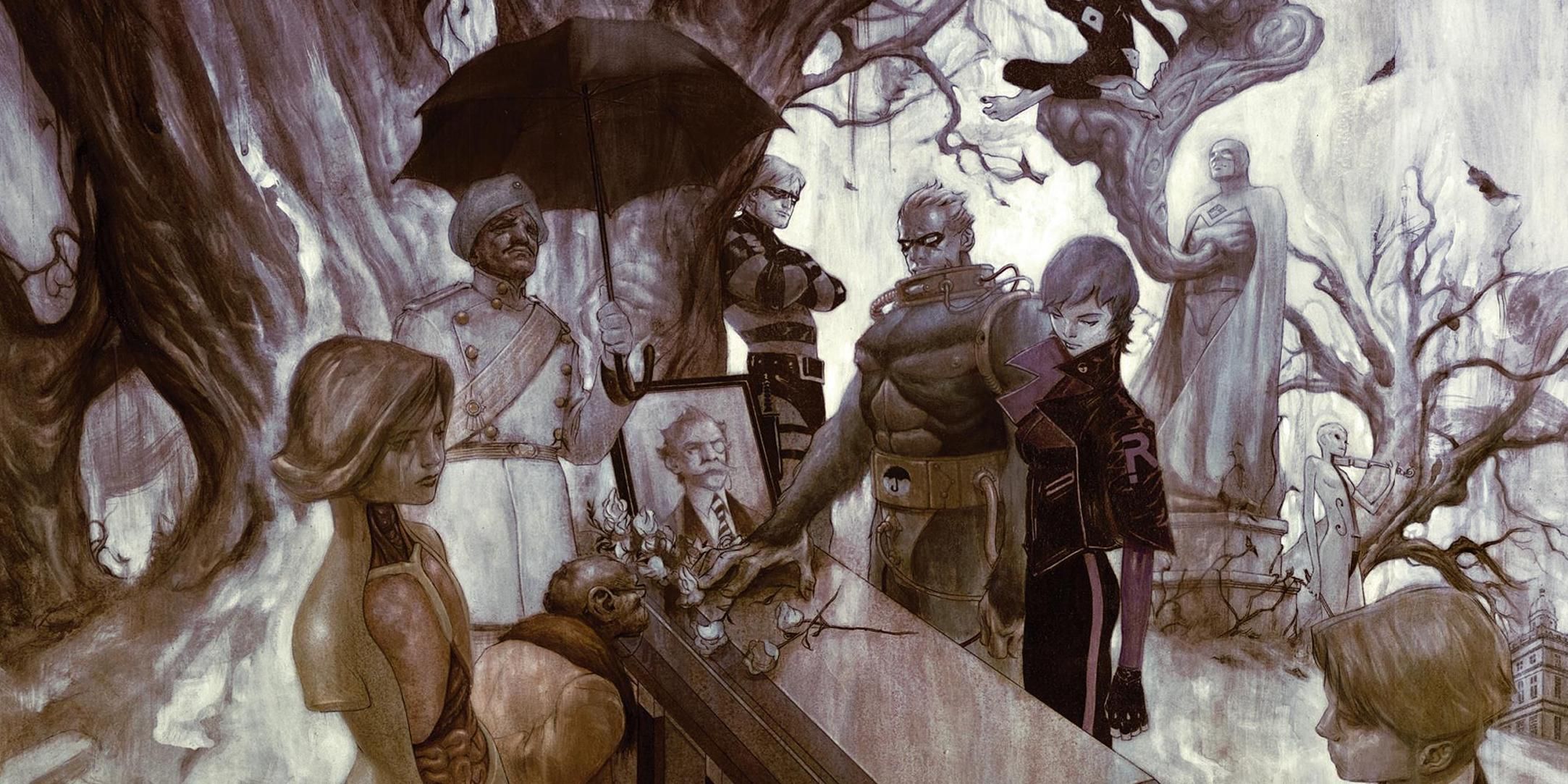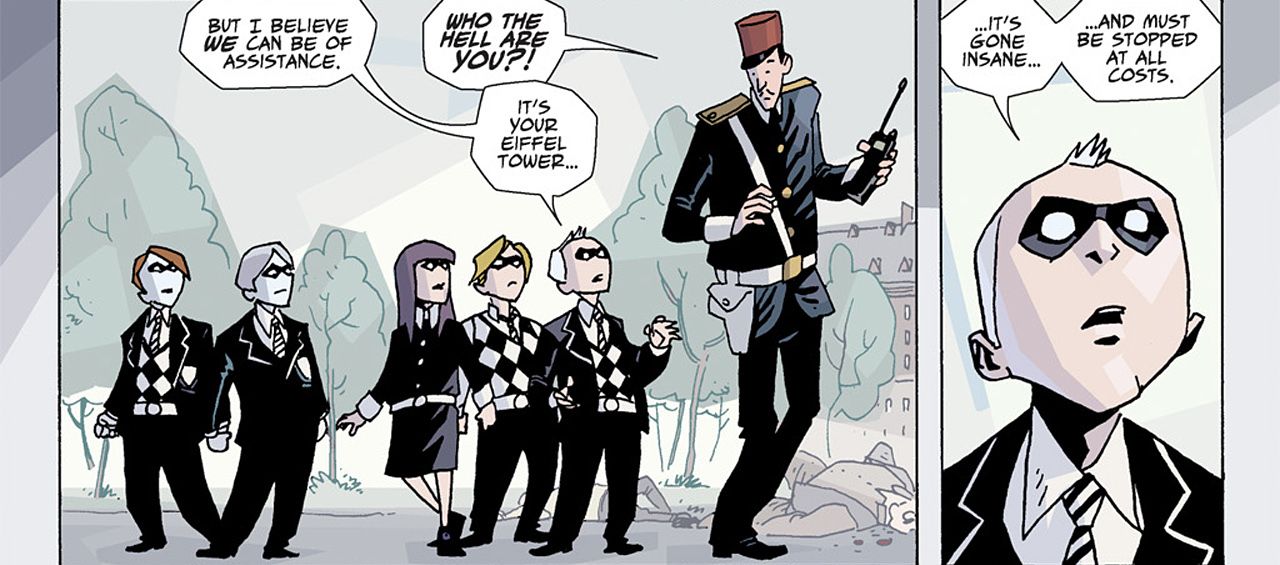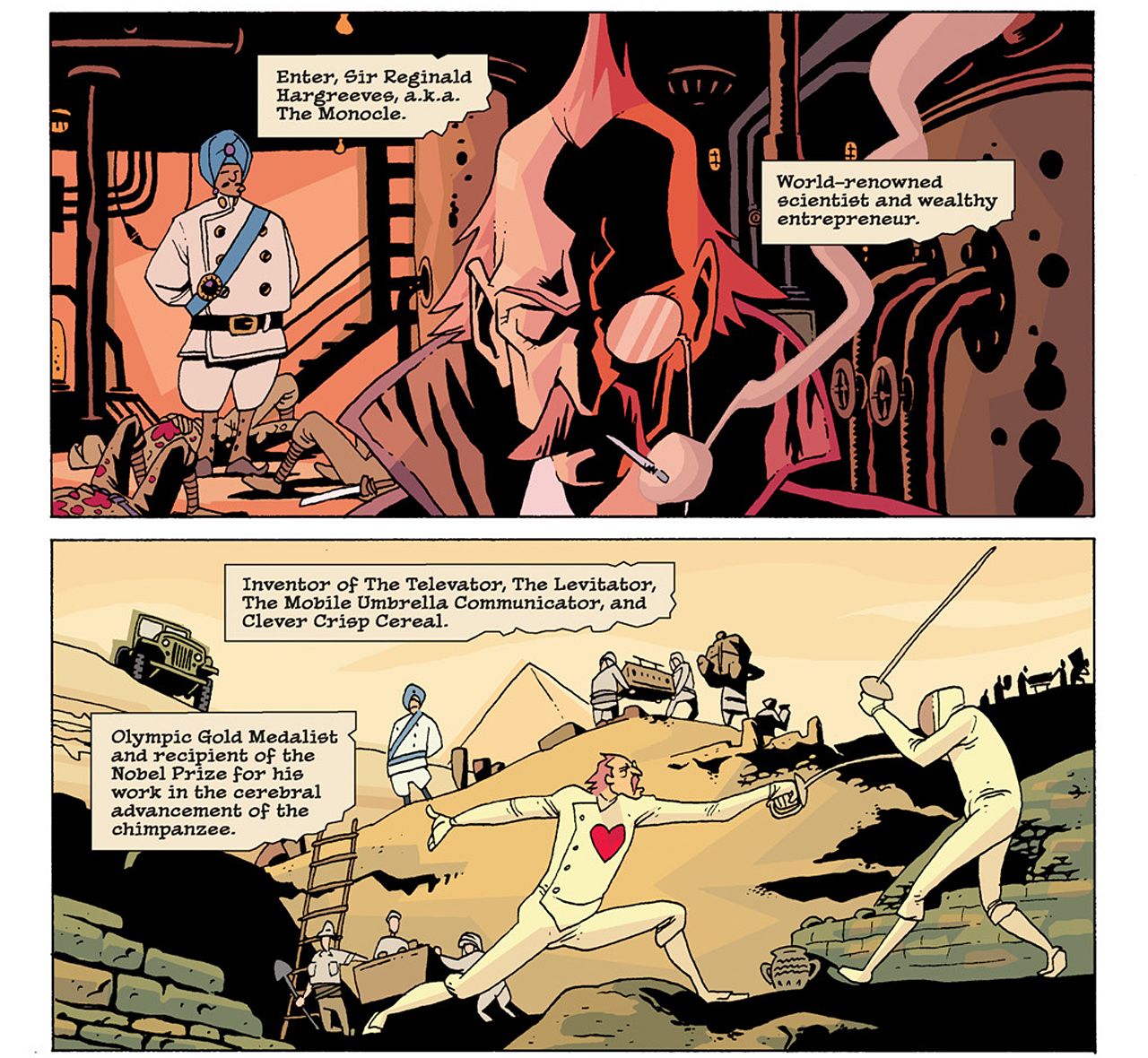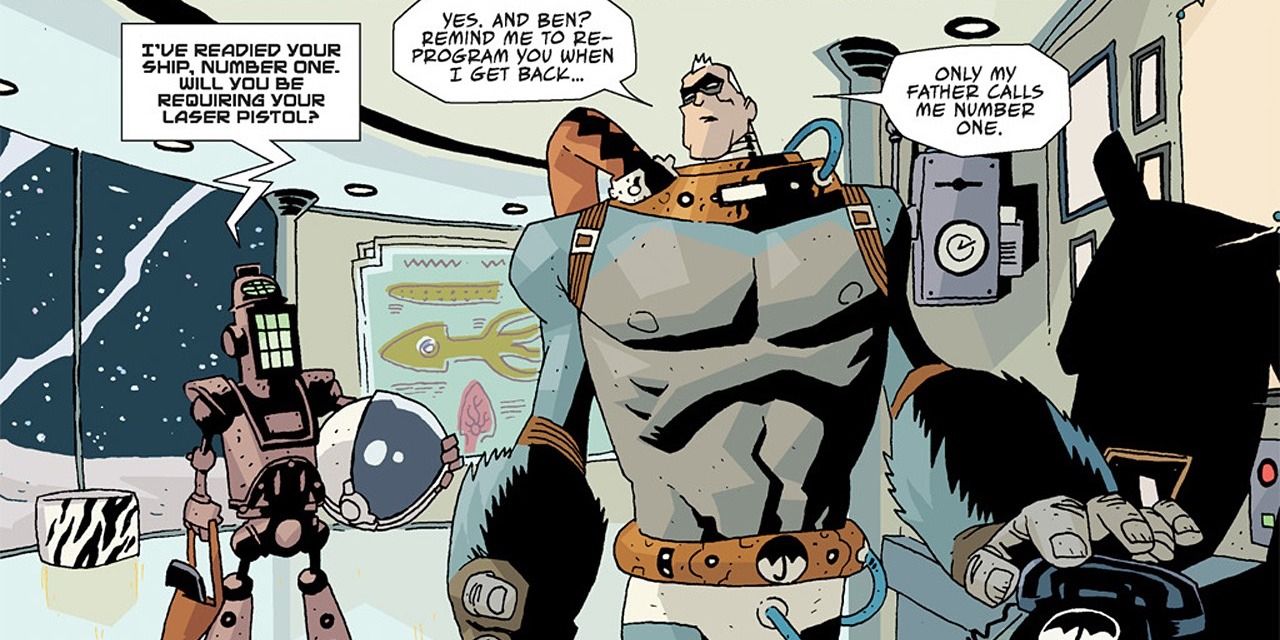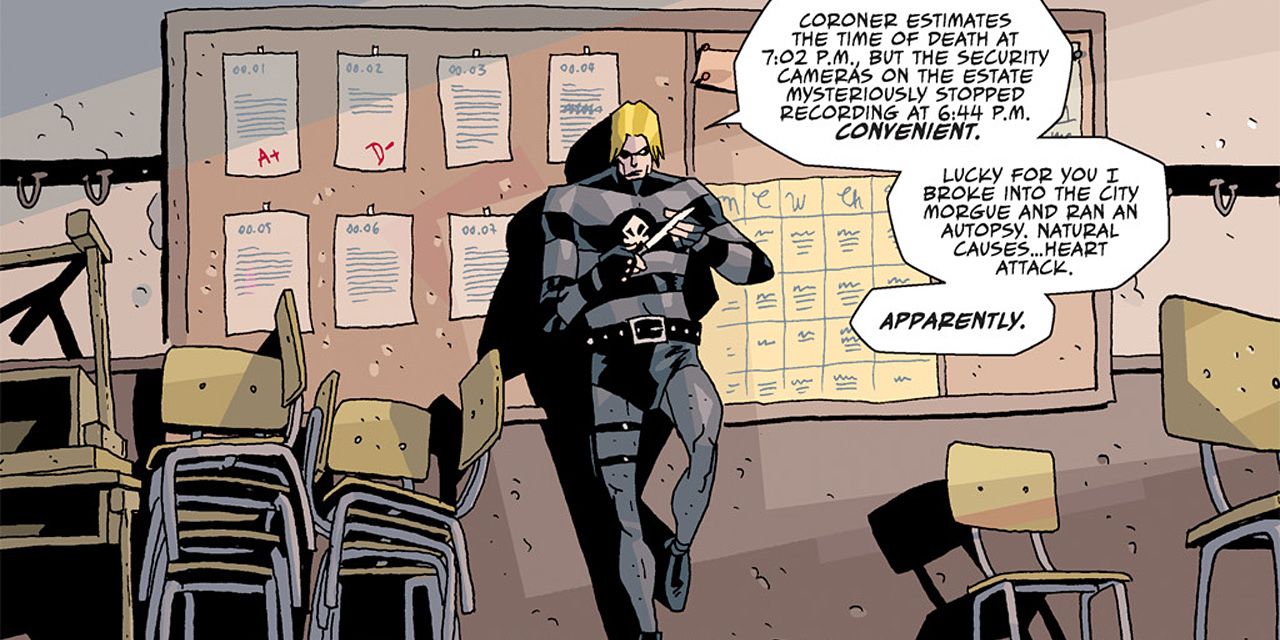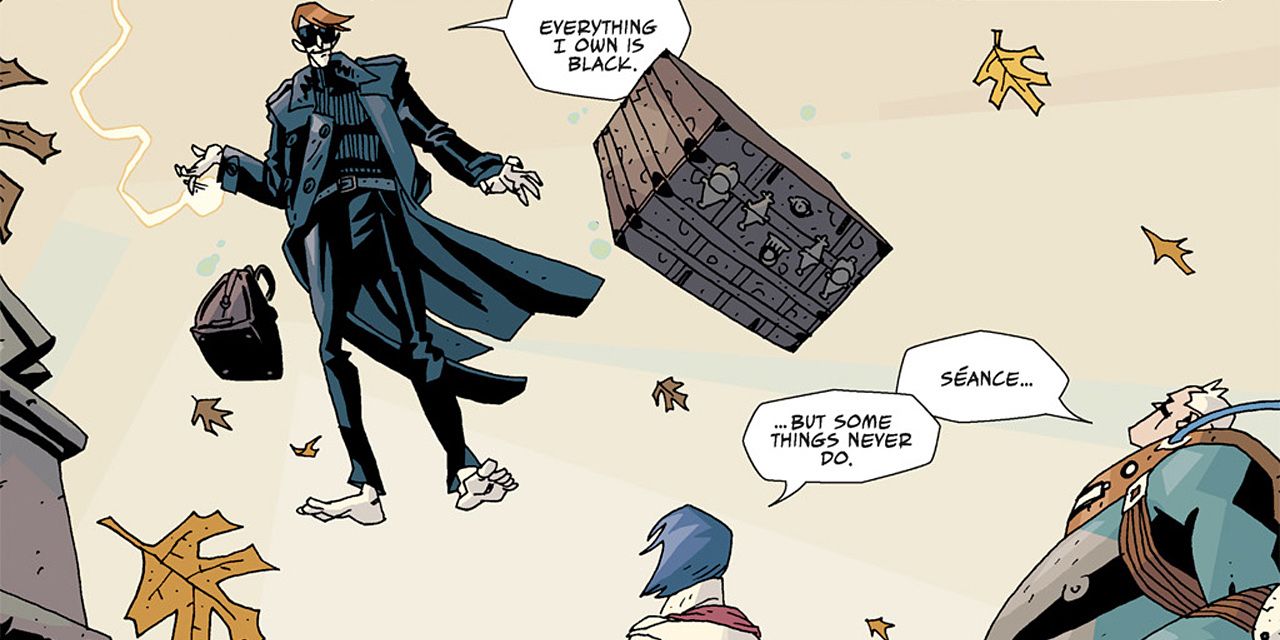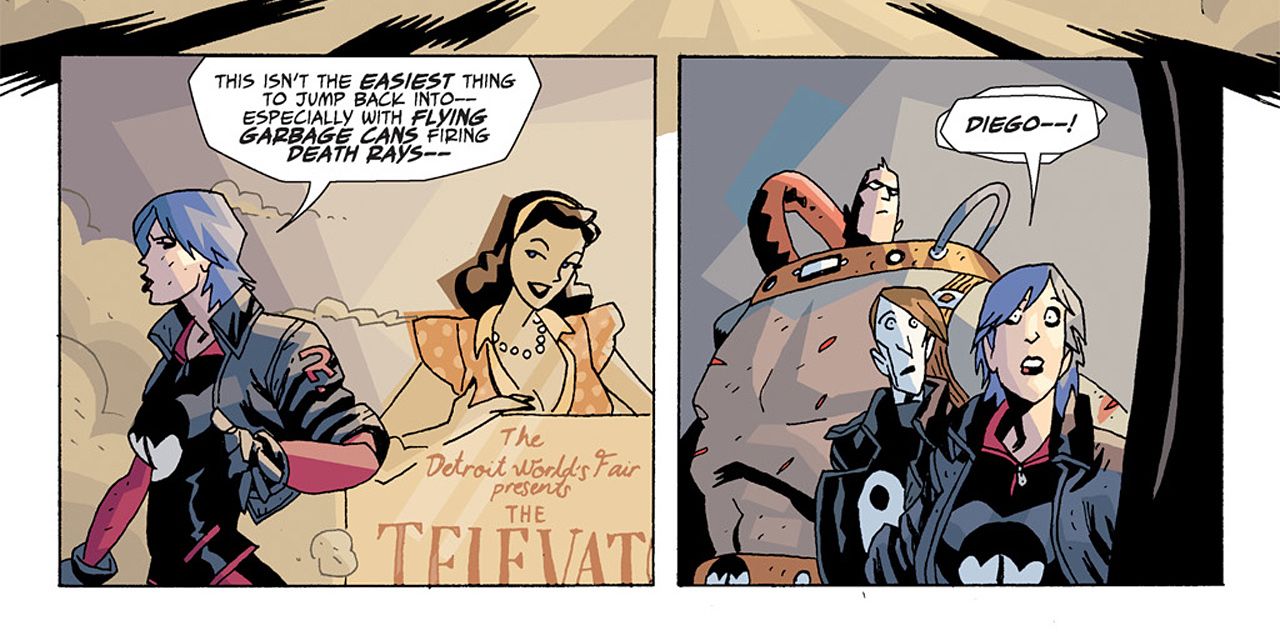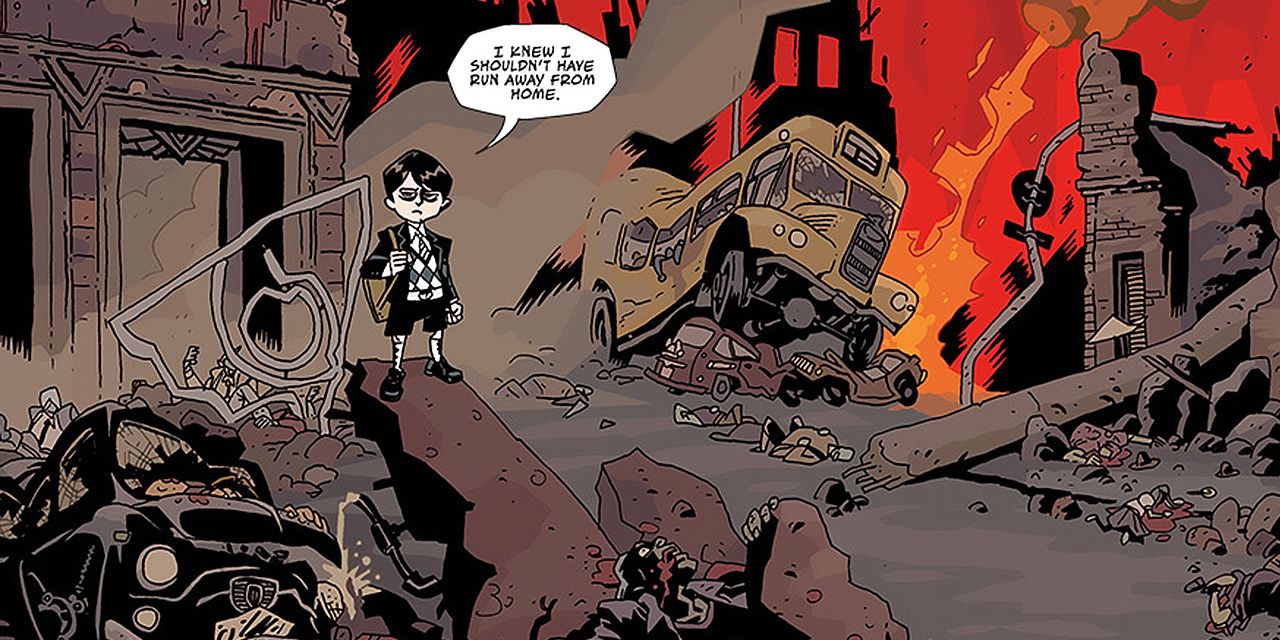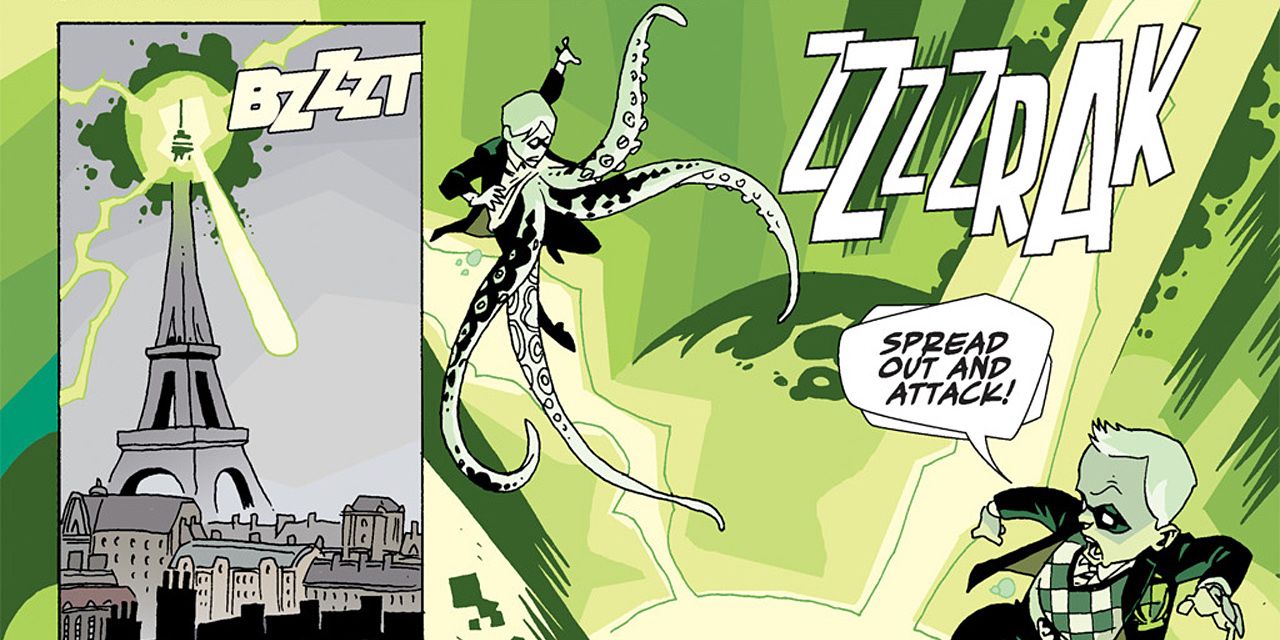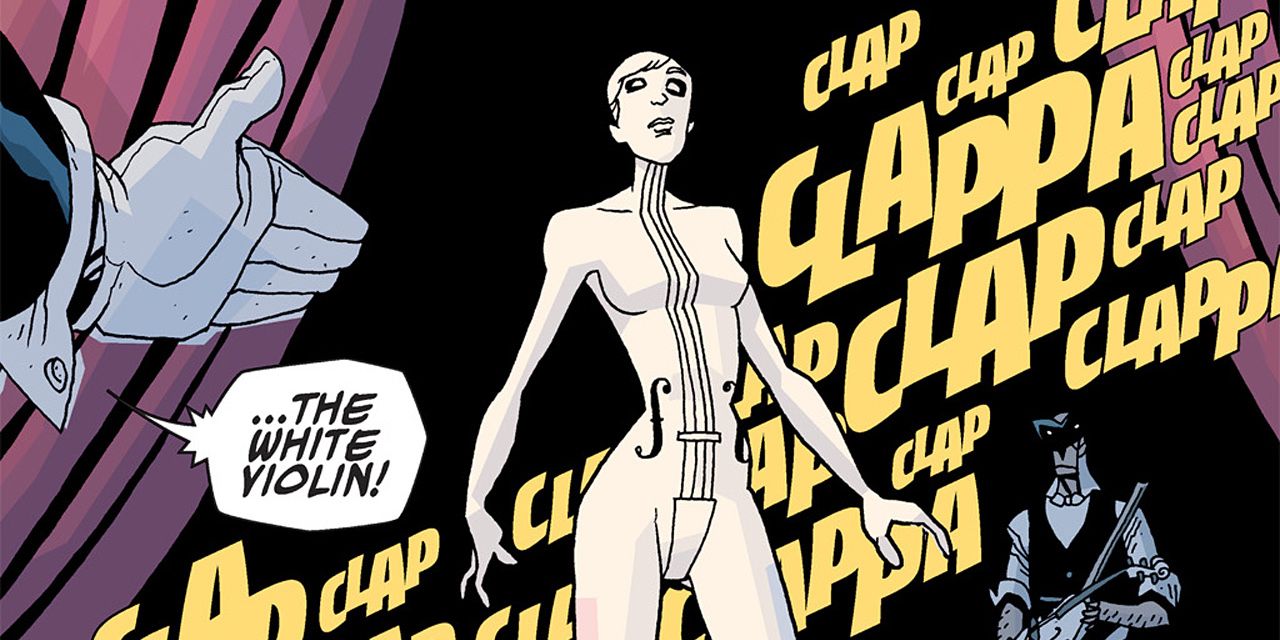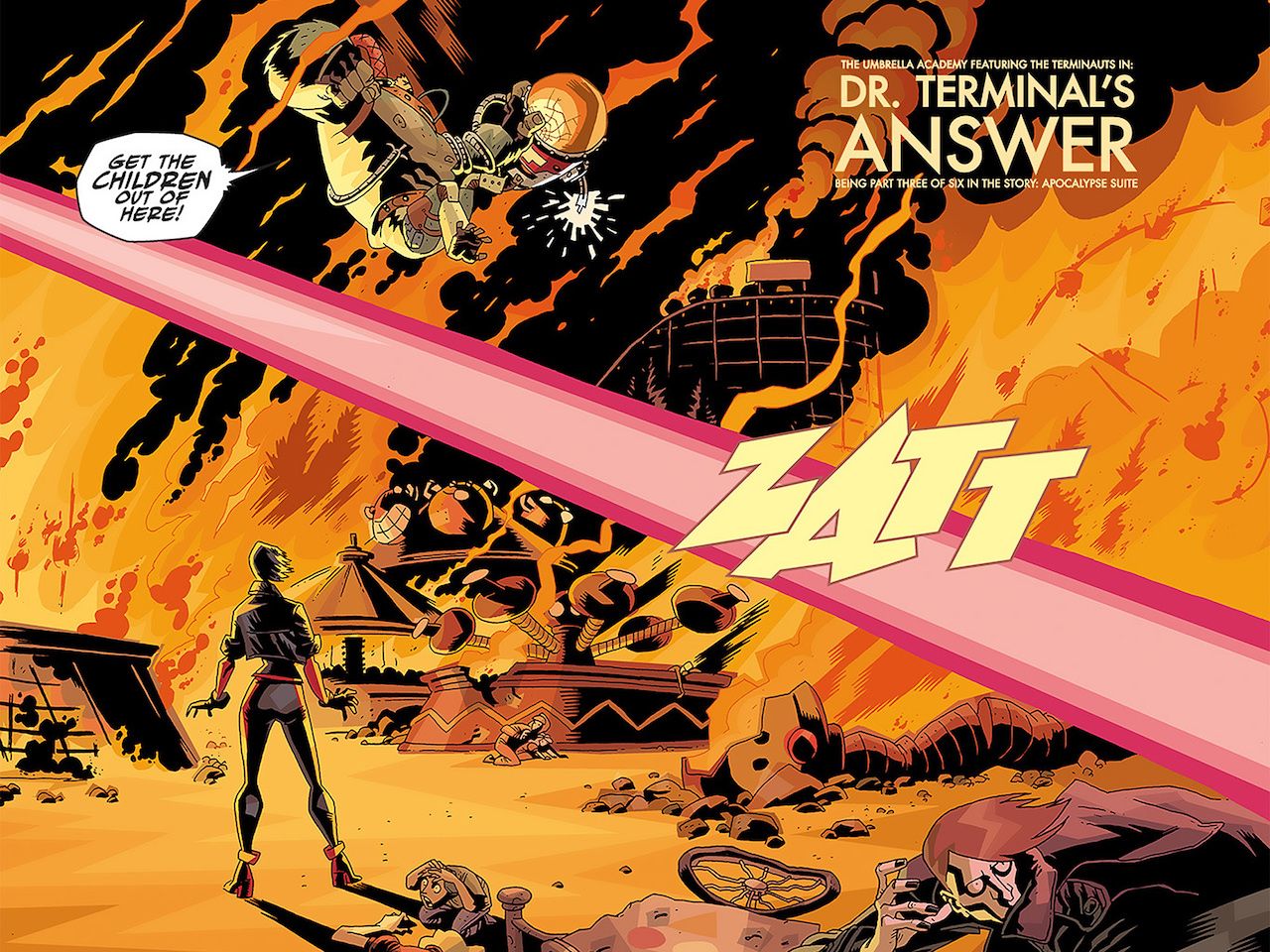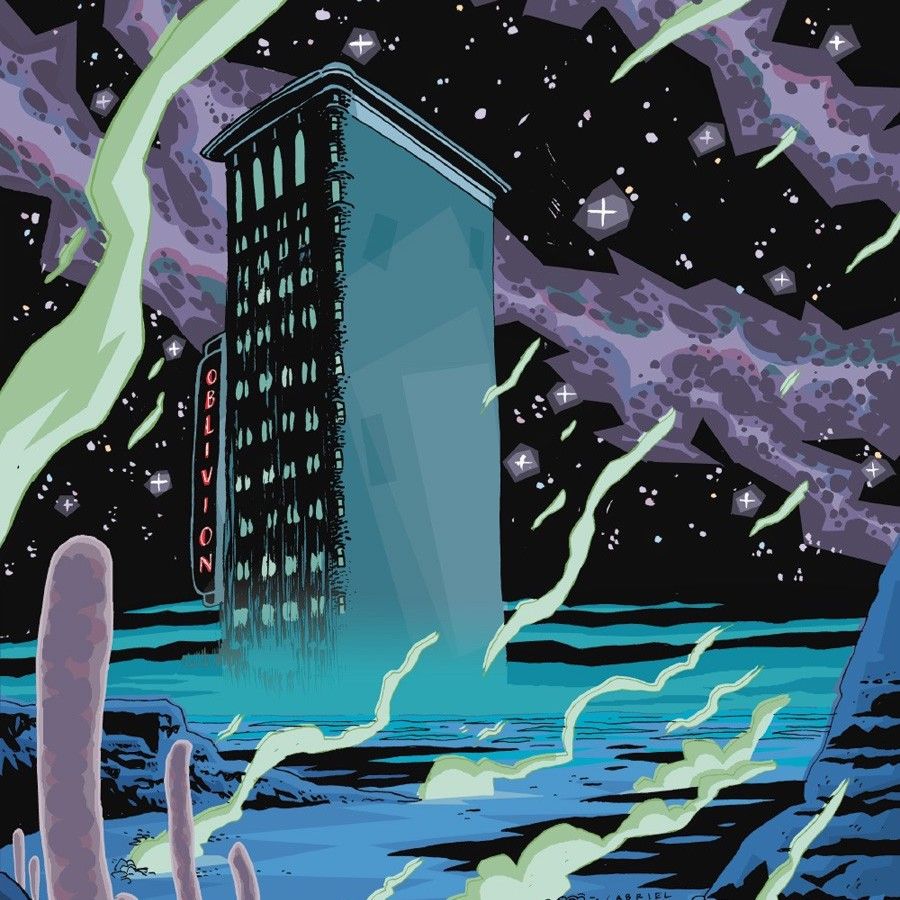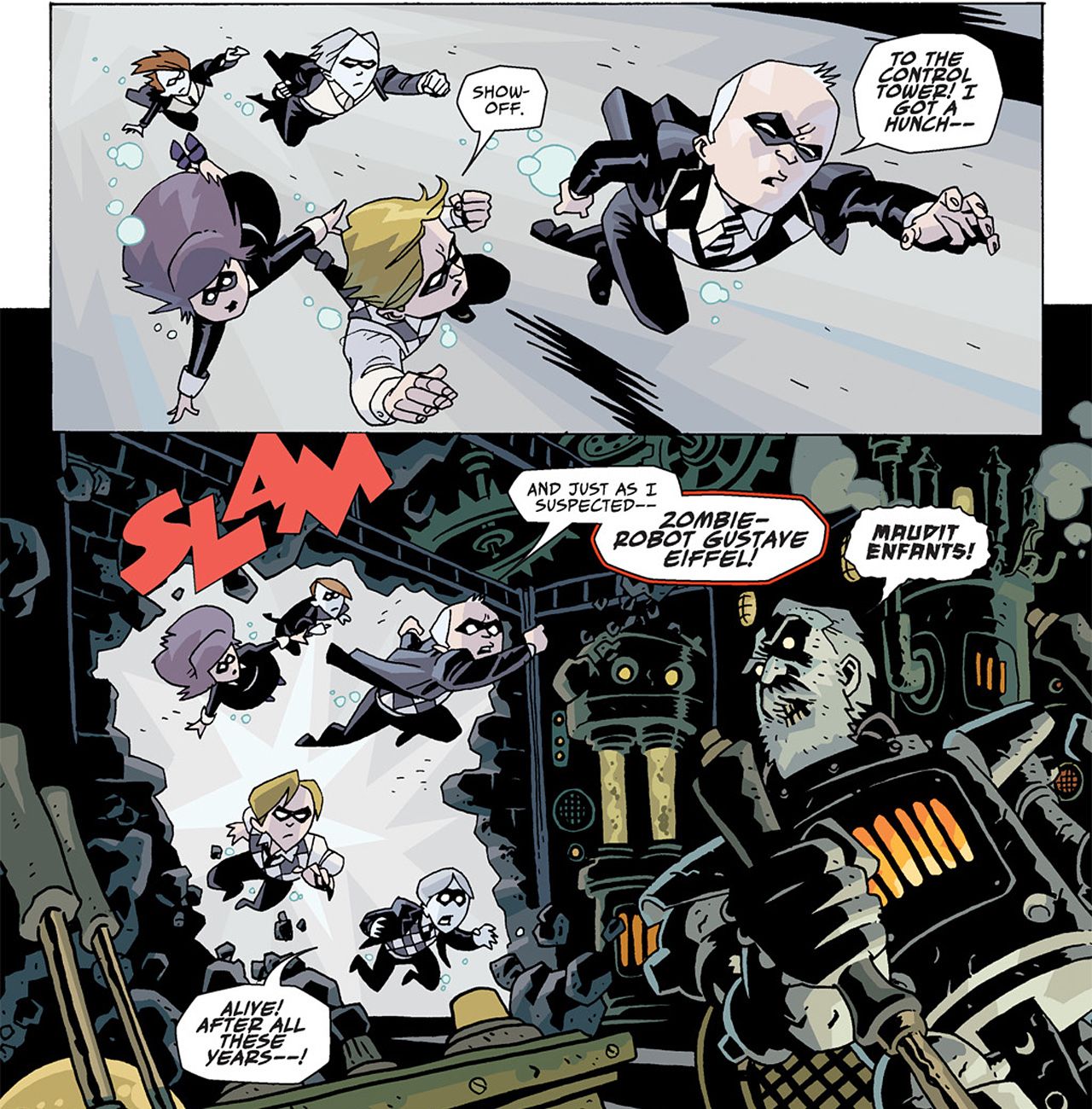At last, it's official: A live-action television drama based on The Umbrella Academy, the acclaimed Dark Horse comic by Gerard Way and Gabriel Bá, is headed to Netflix.
RELATED: The Umbrella Academy TV Series Announced By Netflix
The adaptation is a long time coming, with Universal Pictures acquiring the film rights shortly after the 2007 debut of The Umbrella Academy: The Apocalypse Suite. Those plans stalled, however, and the comic was eventually included in a development deal announced in 2015 between Dark Horse and Universal Cable Productions. But now the dysfunctional family of superheroes has finally found a home at Netflix, which has ordered a 10-episode first season.
There would seem no better time to take a look back at the original comic, and look ahead to what we might expect from the TV adaptation.
What Is The Umbrella Academy?
Just as “Tusslin’ Tom” Gurney knocked out the space-squid from Rigel X-9, 43 babies were simultaneously born to non-pregnant women across the globe. The series follows the titular Umbrella Academy, who are seven of these extraordinary children, adopted by the mysterious Sir Hargreeves, and raised to be superheroes. Each of them possesses a unique superpower, ranging from super-strength to time travel.
RELATED: For Dangerous Humans: Gerard Way’s 17 Craziest And Weirdest Comics
The series takes place in a world where John F. Kennedy wasn’t assassinated; intellectual chimpanzees are normal and an orchestral performance is the key to the apocalypse. The series’ first arc, “The Apocalypse Suite” was released in 2007 by Dark Horse, and focused on the Academy reuniting for the first time in years when Hargreeves mysteriously passes away. They also have to stop the aforementioned apocalypse from happening. The second arc “Dallas”, which was released the year after, had the team once again trying to prevent the apocalypse by going back in time and assassinating JFK.
Who Is The Umbrella Academy?
The Monocle, aka Sir Reginald Hargreeves
Inventor. Entrepreneur. Olympic gold medalist. Nobel Prize winner. Space alien. Terrible dad. He adopted the seven children for one purpose: to save the world. He acts as the team’s leader, much like Professor Xavier or Niles Caulder.
He may be the children's adoptive father, but he doesn’t act like it. He doesn’t treat them like children, only referring to them by their code names, not allowing them to call him “father” and running experiments on them while they sleep. He’s not totally irredeemable, though; he does reward them with ice cream after they defeat zombie-robot Gustave Eiffel. His unexpected death brings the team together for the first time in a decade.
#00.01: Spaceboy, aka Luther Hargreeves
Possessing super-strength, Luther also “Excels at everything he tries, particularly aviation and marksmanship – and knows it.” The Monocle’s favorite child and the leader of the Umbrella Academy, he's real Boy Scout, through and through. When a mission to Mars goes awry, Spaceboy’s head is surgically transplanted onto the body of a Martian gorilla. As an adult he spends most of his time on the Moon, on the watch for potential world-ending threats, alone except for his robot assistant Ben.
#00.02: The Kraken, aka Diego Hargreeves
While the rest of his family have given up superheroics, the Kraken became a Batman-esque vigilante. He even has the Dark Knight’s silent disappearing act down pat, managing to slip out of a moving car unnoticed. His cold demeanor has created a large emotional gap between himself and his adoptive siblings, and hot-headedness usually puts him at odds with Spaceboy.
He has the ability to hold his breath indefinitely, and even at a young age was a highly skilled knife-thrower.
#00.03: The Séance, aka Klaus Hargreeves
He’s Thin White Duke David Bowie and Lou Reed rolled into one – especially when it comes to copious drug use. By far the most unhinged of the group, one time checking himself into Shinyview psychiatric hospital (specifically the comatose ward, because he preferred the company). Klaus possesses telekinesis, and some level of psychic ability that lets him both speak to the dead and possess the living. His one weakness? His powers stop working when he’s wearing shoes!
#00.04: The Rumor, aka Allison Hargreeves
What if every lie you told became true? That’s pretty much The Rumor’s powers in a nutshell: fibs that bend reality to make them true. For example, her powers created a perfect duplicate of herself after she lied about going to the library at night to study polygraph science, when really she was sneaking off with a Polynesian knife-thrower. She gave up being a superhero and tried to live a normal life with her daughter and husband, but they eventually divorced. As a child, her left arm was eaten by mad scientist Dr. Terminal and later replaced with a cybernetic one.
#00.05: The Boy, aka ... ???
His name unknown, he's usually referred as The Boy, or by his numerical code name. Number Five has the ability to travel through time, but unfortunately hadn’t mastered the ability to travel back. So when he jumped 20 years into the future, three days after Hargreeves' death and the day after the apocalypse, and spent 50 years trying to figure out how to go back.
When he did finally work out how to return to the past to warn his family about the End of Days, he reverted to his 10-year-old appearance, permanently unable to age. While traveling back in time, he was captured, employed and surgically enhanced to become a perfect killer by the Temps Aeternalis, an agency dedicated to protecting the time continuum.
#00.06: The Horror, aka Ben Hargreeves
The most mysterious member of the Academy, because barely anything is known about him – except that he can summon inter-dimensional demons from beneath his skin, usually in the form of tentacles that sprout from his chest. He died sometime before Apocalypse Suite opens. The specifics of his death aren’t known, but Spaceboy feels guilty for what happened.
#00.07: The White Violin, aka Vanya Hargreeves
Vanya was raised to believe that, unlike her siblings, she didn’t possess any powers, and she later wrote a tell-all book detailing the years of emotional abuse she suffered as a part of the Umbrella Academy. Reginald Hargreeves was particularly harsh toward her, regularly telling her that she wasn’t special. In Apocalypse Suite, however, it’s revealed she's actually the most powerful member of the Academy. Her father's bullying and her medication were used to control and diminish her abilities to ensure she could never use them because of how potentially dangerous they are.
RELATED: Dark Horse Comics, Universal Cable Productions Team Up to Produce Comics-Based Shows
After unlocking her hidden ability and becoming The White Violin, she was able to channel those powers through her violin playing. By using music she can create destructive force that is precise enough to slit a throat and strong enough to dislodge a chunk of the Moon and hurl it at Earth. Think Black Bolt crossed with a Stradivarius.
What's So Great About The Umbrella Academy?
The easy sell is that if you’re reading and enjoying Way's Doom Patrol run, and DC's Young Animals imprint as a whole, The Umbrella Academy is definitely up your alley. Just like the Young Animals books, The Umbrella Academy celebrates how weird and imaginative comics can be. It’s a superhero story, but everything feels so fresh. The world created by Way and Bá is so interesting, you want to know more about the lives (both past and future) of the Umbrella Academy members -- and if you’ve been reading from Day One, you know the almost decade-long pain of waiting for more.
RELATED: Gerard Way Calls DC’s Young Animal His “Home,” Promises More “Umbrella Academy
Everything about it is sharp, from dialogue to pacing to art. Seriously, take one look at Bá’s amazing art and tell us you don’t want to immediately pick that up. He knows how to perfectly frame a scene for full dramatic impact, and doesn’t hold back when it comes to action sequences.
Way has pointed out how big an influence Grant Morrison’s comics were on him – especially his late-1980s/early-'90s Doom Patrol run – and that really shows when reading The Umbrella Academy. It’s quirky and strange, without being obnoxious. It tackles the same theme of misfits and outcasts coming together to form a family, and how important that relationship is despite how dysfunctional they all are. It’s a character drama that just happens to be a weird superhero book.
From Page to Screen
With The Umbrella Academy coming to Netflix, it’d make sense for Apocalypse Suite and its sequel Dallas to form seasons one and two. There are also a handful of short one-off stories that could be used as flashbacks to flesh out the team’s characters and the 10-episode season.
Way announced in 2009 that the third volume of the series would be called Hotel Oblivion, which seems to be the Umbrella Academy’s equivalent of Arkham Asylum and The Phantom Zone (the only teaser art has the Hotel standing on some kind of weird alien world). While we haven’t seen anything new for Hotel Oblivion, Way has tweeted that he and Bá have been working on it, along with an untitled fourth volume.
Depending on how the Netflix series progresses, we may get a Game of Thrones-style situation in which the adaptation outpaces the source material (Way is busy writing Doom Patrol and Cave Carson, while also curating the Young Animals line). Who knows, we might even see some new material that diverges from the comics. We don’t know how The Horror died, and the Umbrella Academy are only seven of the 43 randomly born babies (although not all of that number survived).
The Umbrella Academy is unique take on the superhero genre should also help it stand out when compared to Marvel's Netflix dramas and The CW's Arrow-verse series. It's much less grounded, preferring to embrace the weird instead of the realistic. Apart from Legion, no other superhero show is doing that, so it could be a nice breath of fresh air.
As long as it has a zombie-robot Gustave Eiffel piloting the Eiffel Tower like a spaceship, we’ll definitely be watching.

